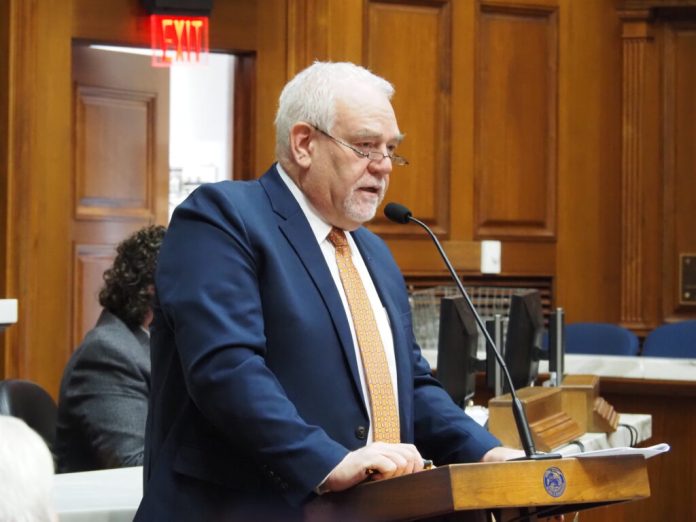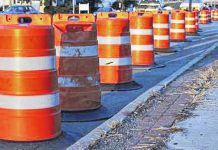
Indiana Capital Chronicle
For The Republic
INDIANAPOLIS — Multiple major bills — including those on child care, disaster relief and birth control — inched closer to the governor’s desk Monday as state lawmakers kicked off what’s expected to be the final week of the 2024 legislative session.
More than a dozen bills are still under negotiation or pending a final vote from legislators, however.
Among those are proposals to define and ban antisemitism at Hoosier colleges, allow chaplains in schools, provide reimbursement for ambulance expenses and restrict foreign ownership of Indiana farmland.
Monday was the last day for the House to approve Senate bills. The Senate faces a Tuesday deadline to vote House bills back to the opposite chamber.
House wraps up discussion on Senate bills
In the House, lawmakers pushed the final dozen-plus bills across the finish line to meet their third reading deadline.
Senate Bill 2, a priority for Republican senators, heads back to the Senate after a House committee opted to add after-school and out-of-school programs to the child care proposal. Should the Senate agree with the changes in a concurrence vote, then it’ll move to Gov. Eric Holcomb’s desk.
“Senate Bill 2 will improve the overall effectiveness of a child care system while maintaining health and safety standards,” said House sponsor Rep. Dale DeVon.
The bill passed on a 98-1 vote, with Rep. Ryan Dvorak, D-South Bend, voting against the bill.
The measure, authored by Sen. Ed Charbboneau, would create pilot “microcenters,” mandate a study on child care worker salaries and decrease certain regulations on providers. Charbonneau, a Republican from Valparaiso, explicitly sought child care fixes with no price tag in a non-budget year, drawing from a list of interim committee recommendations.
Other House agenda items included a dual disaster effort, one a Holcomb priority headed straight for his desk and another that would limit the emergency powers of the governor’s office.
Senate Bill 190 tweaks the existing state disaster relief fund to allow higher payments to Hoosiers for certain emergencies while expanding the uses of those dollars to include mitigation efforts.
House legislators also doubled senate restrictions on a governor’s ability to declare a state of disaster emergency. Senators previously limited such executive orders to 30 days, with one 30-day renewal for disasters receiving federal relief funds but the House amended the bill to a 60-day declaration and allowed one 60-day extension with no restrictions.
Rep. Matt Lehman, the House sponsor of the bill, said the measure simply added guidelines for governors to engage with the General Assembly on a statewide emergency.

“Senate Bill 234 begins to set a parameter for future governors as to … when you need to engage the legislative branch,” said Lehman, R-Berne.
During the COVID-19 pandemic, Holcomb repeatedly renewed the statewide disaster declaration with little pushback from lawmakers, who convened multiple times during the statewide emergency.
Rep. Robin Shackleford, D-Indianapolis, wondered where such a law would leave the state should another pandemic like COVID-19 hit Indiana.
“We have to be very careful of putting any maxes or maximum limits on these disaster emergencies,” Shackleford said. “… That (maximum) just puts us in danger not only because of the health of our communities, but also going to put us in danger of not receiving federal funding. Because we’re going to put a limit and a cap on what we can do to statewide emergencies.”
The bill advanced over bipartisan objections, though only Shackleford spoke against the bill, on a 71-27 vote. Republican Reps. Mike Aylesworth, of Hebron, and Ed Clere, of New Albany, joined Democrats against the bill.
Senate weighs in on birth control, health care and more
The Senate also moved several key bills Monday while turning down changes to a contentious birth control bill.
Senate Democrats tried to add intrauterine devices back into a bill about long-acting reversible contraceptives. They were removed earlier in a health committee after opponents pushed a misconception that it is a type of abortion.
“IUDs prevent pregnancies, they do not end them,” said Sen. Shelli Yoder, D-Bloomington.

House Bill 1426 would require hospitals to stock and give information about subdermal implants to women on Medicaid who have just given birth.
Sen. Sue Glick, R-LaGrange — sponsor of the bill — said nothing in the law precludes doctors from giving the women all the birth control options, including IUDs. She noted that subdermal implants can be placed quickly and are easier to remove if there are complications.
But Yoder, who offered the amendment, said “the reality is having limited contraception options is not better for Hoosiers. HB 1426 currently perpetuates a misconception … and it advances harmful stigmas about a very popular contraceptive option for many Hoosiers.”
The amendment failed 11-38.
The bill earlier this session passed the House 94-4 with both options.
Other bills that cleared the Senate Monday are:
- Senate Bill 9 was approved by a vote of 42-6. It would require health care entities making an acquisition valued at $10 million or more report such a purchase with the attorney general’s office, which would conduct an antitrust review. More than two dozen other states already require such a report, 13 of which also stipulate that the office must approve the acquisition. Indiana didn’t include the latter — which concerned members of both parties. The bill now goes to the governor.
- Senate Bill 17 passed 46-2 and would require websites hosting pornographic content to verify the ages of users. It now goes to the governor.
- House Bill 1120 previously had a host of small property tax tweaks before the Senate removed them. It was approved 49-0. The bill is likely going to a conference committee for final negotiation.
- House Bill 1329 was approved 45-3. It blocks local health departments from requiring inspections of residential septic systems upon the sale of the property. The House can either accept the changes or dissent and negotiate a compromise.
- House Bill 1352 contains another septic system provision, which further limits when local governments can inspect a system. It passed 47-1 and the House must accept the changes or send it to a conference committee.
The Indiana Capital Chronicle covers state government and the state legislature. For more visit indianacapitalchronicle.com.




